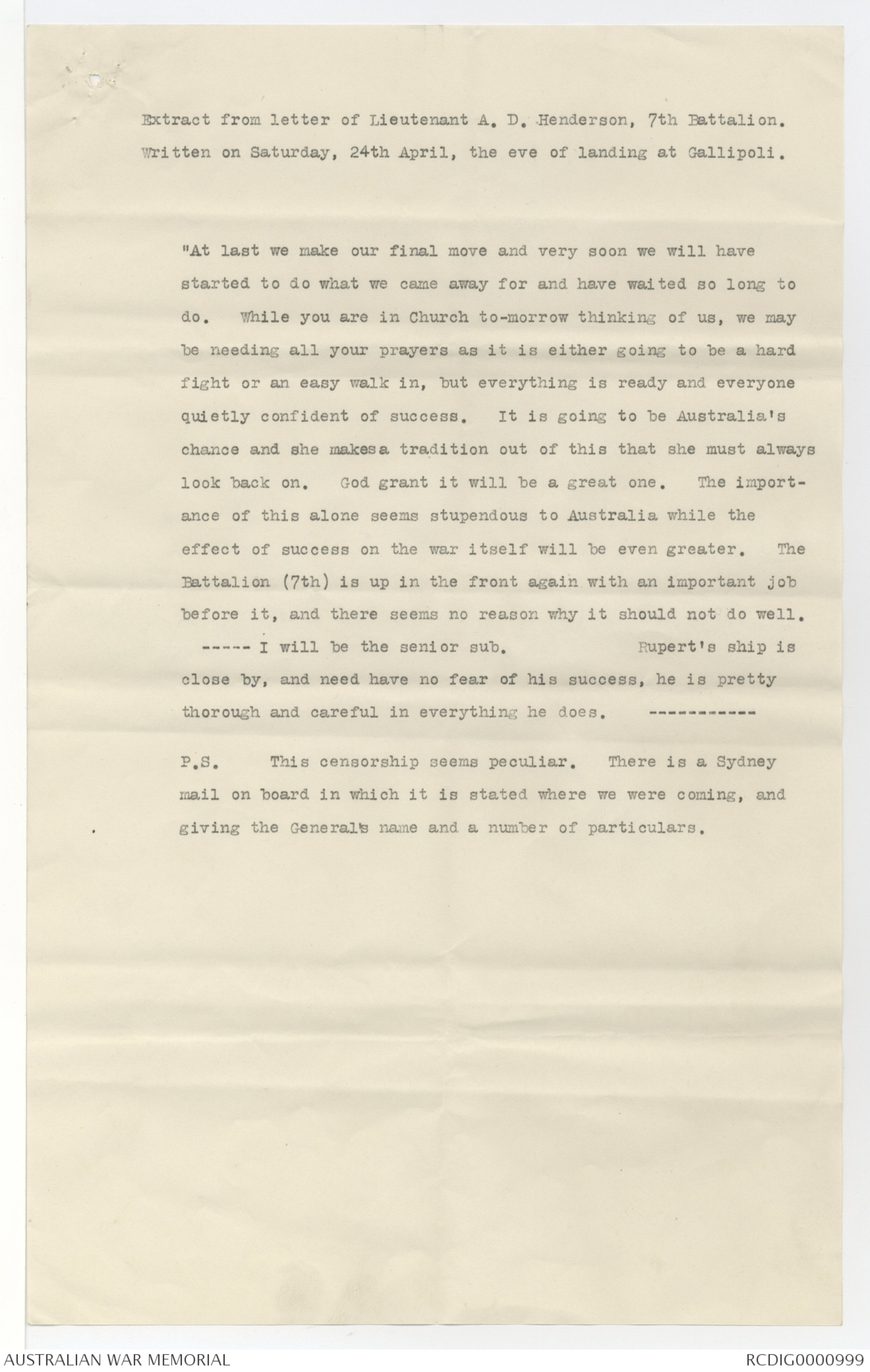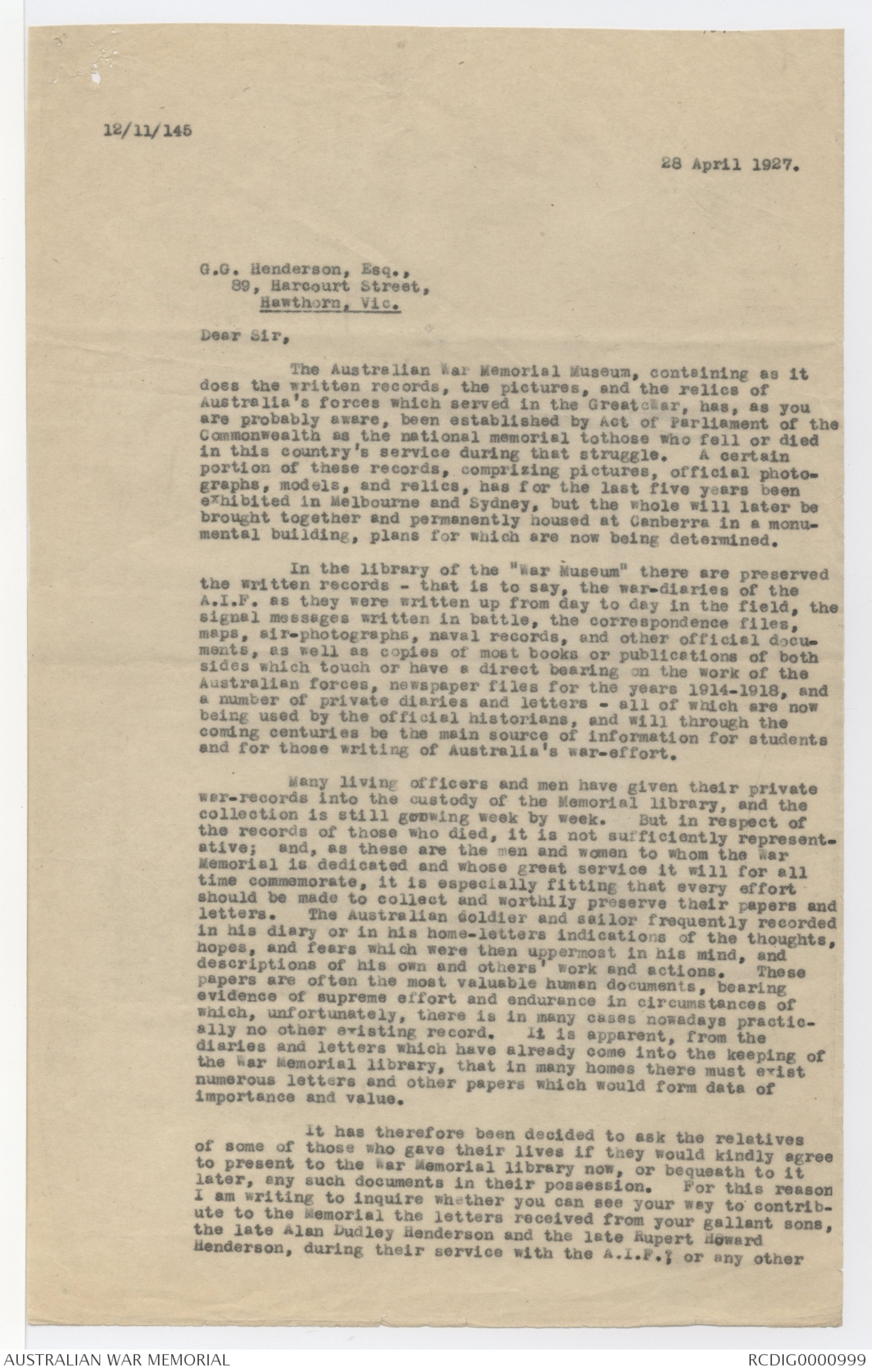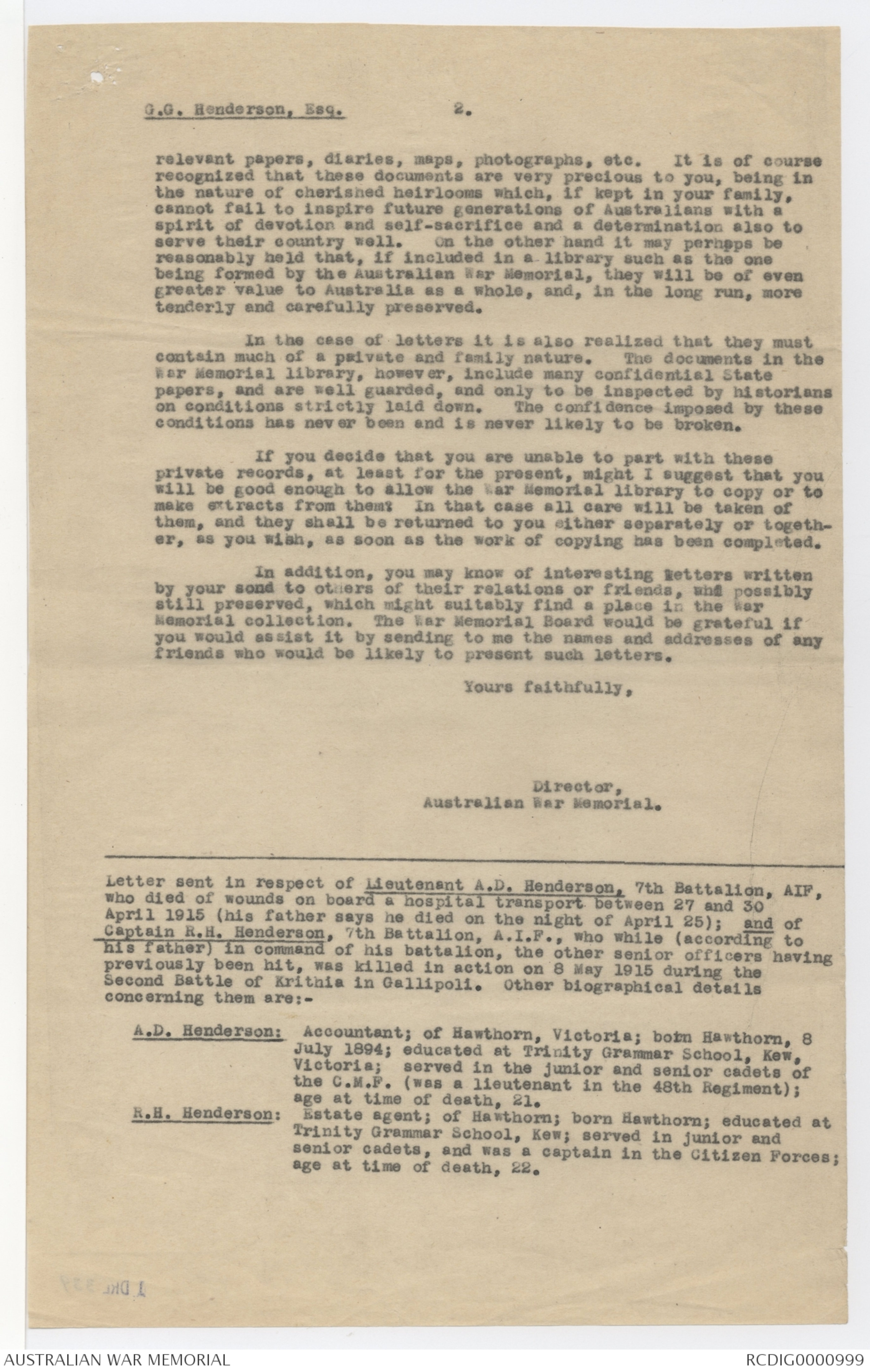Alan Dudley Henderson, Letters, 1915-1927



Extract from letter of Lieutenant A. D. Henderson, 7th Battalion.
Written on Saturday, 24th April, the eve of landing at Gallipoli.
"At last we make our final move and very soon we will have
started to do what we came away for and have waited so long to
do. While you are in Church to-morrow thinking of us, we may
be needing all your prayers as it is either going to be a hard
fight or an easy walk in, but everything is ready and everyone
quietly confident of success. It is going to be Australia's
chance and she makes a tradition out of this that she must always
look back on. God grant it will be a great one. The importance
of this alone seems stupendous to Australia while the
effect of success on the war itself will be even greater. The
Battalion (7th) is up in the front again with an important job
before it, and there seems no reason why it should not do well.
----- I will be the senior sub. Rupert's ship is
close by, and need have no fear of his success, he is pretty
thorough and careful in everything he does.---------
P.S. This censorship seems peculiar. There is a Sydney
mail on board in which it is stated where we were coming, and
giving the General's name and a number of particulars.
12/11/145
28 April 1927.
G.G. Henderson, Esq.,
89, Harcourt Street,
Hawthorn, Vic.
Dear Sir,
The Australian War Memorial Museum, containing as it
does the written records, the pictures, and the relics of
Australia's forces which served in the GreatcWar, has, as you
are probably aware, been established by Act of Parliament of the
Commonwealth as the national memorial tothose who fell or died
in this country's service during that struggle. A certain
portion of these records, comprizing pictures, official photographs,
models, and relics, has for the last five years been
exhibited in Melbourne and Sydney, but the whole will later be
brought together and permanently housed at Canberra in a monumental
building, plans for which are now being determined.
In the library of the "War Museum" there are preserved
the written records - that is to say, the war-diaries of the
A.I.F. as they were written up from day to day in the field, the
signal messages written in battle, the correspondence files,
maps, air-photographs, naval records, and other official documents,
as well as copies of most books or publications of both
sides which touch or have a direct bearing on the work of the
Australian forces, newspaper files for the years 1914-1918, and
a number of private diaries and letters - all of which are now
being used by the official historians, and will through the
coming centuries be the main source of information for students
and for those writing of Australia's war-effort.
Many living officers and men have given their private
war-records into the custody of the Memorial library, and the
collection is still growing week by week. But in respect of
the records of those who died, it is not sufficiently representative;
and, as these are the men and women to whom the War
Memorial is dedicated and whose great service it will for all
time commemorate, it is especially fitting that every effort
should be made to collect and worthily preserve their papers and
letters. The Australian soldier and sailor frequently recorded
in his diary or in his home-letters indications of the thoughts,
hopes, and fears which were then uppermost in his mind, and
descriptions of his own and others' work and actions. These
papers are often the most valuable human documents, bearing
evidence of supreme effort and endurance in circumstances of
which, unfortunately, there is in many cases nowadays practically
no other existing record. It is apparent, from the
diaries and letters which have already come into the keeping of
the War Memorial library, that in many homes there must exist
numerous letters and other papers which would form data of
importance and value.
It has therefore been decided to ask the relatives
of some of those who gave their lives if they would kindly agree
to present to the War Memorial library now, or bequeath to it
later, any such documents in their possession. For this reason
I am writing to inquire whether you can see your way to contribute
to the Memorial the letters received from your gallant sons,
the late Alan Dudley Henderson and the late Rupert Howard
Henderson, during their service with the A.I.F., or any other
G.G. Henderson, Esq. 2.
relevant papers, diaries, maps, photographs, etc. It is of course
recognized that these documents are very precious to you, being in
the nature of cherished heirlooms which, if kept in your family,
cannot fail to inspire future generations of Australians with a
spirit of devotion and self-sacrifice and a determination also to
serve their country well. On the other hand it may perhaps be
reasonably held that, if included in a library such as the one
being formed by the Australian War Memorial, they will be of even
greater value to Australia as a whole, and, in the long run, more
tenderly and carefully preserved.
In the case of letters it is also realized that they must
contain much of a private and family nature. The documents in the
War Memorial library, however, include many confidential State
papers, and are well guarded, and only to be inspected by historians
on conditions strictly laid down. The confidence imposed by these
conditions has never been and is never likely to be broken.
If you decide that you are unable to part with these
private records, at least for the present, might I suggest that you
will be good enough to allow the War Memorial library to copy or to
make extracts from them? In that case all care will be taken of
them, and they shall be returned to you either separately or together,
as you wish, as soon as the work of copying has been completed.
In addition, you may know of interesting letters written
by your sond to others of their relations or friends, who possibly
still preserved, which might suitably find a place in the War
Memorial collection. The War Memorial Board would be grateful if
you would assist it by sending to me the names and addresses of any
friends who would be likely to present such letters.
Yours faithfully,
Director
Australian War Memorial.
Letter sent in respect of Lieutenant A.D. Henderson, 7th Battalion, AIF,
who died of wounds on board a hospital transport between 27 and 30
April 1915 (his father says he died on the night of April 25); and of
Captain R.H. Henderson,, 7th Battalion, A.I.F., who while (according to
his father) in command of his battalion, the other senior officers having
previously been hit, was killed in action on 8 May 1915 during the
Second Battle of Krithia in Gallipoli. Other biographical details
concerning them are:-
A.D. Henderson: Accountant; of Hawthorn, Victoria; born Hawthorn, 8
July 1894; educated at Trinity Grammar School, Kew,
Victoria; served in the junior and senior cadets of
the C.M.F. (was a lieutenant in the 48th Regiment);
age at time of death, 21.
R.H. Henderson: Estate agent; of Hawthorn; born Hawthorn; educated at
Trinity Grammar School, Kew; served in junior and
senior cadets, and was a captain in the Citizen Forces;
age at time of death, 22.
 Lulu B
Lulu BThis transcription item is now locked to you for editing. To release the lock either Save your changes or Cancel.
This lock will be automatically released after 60 minutes of inactivity.